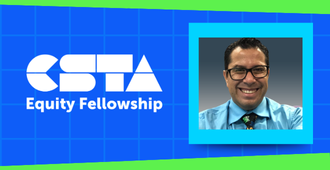Rudy Escobar is a STEM and computer science coordinator with the Stanislaus County Office of Education in California. He is also a micro:bit Champion, and he holds an M.Ed. focused in STEAM. Rudy serves as CSTA Sacramento’s technology manager and Central California CUE’s communications manager, and he actively contributes to Computer Science for California (CSforCA), Supporting Computer Science Access, Leadership, and Equity in California (SCALE-CA), AIforCA, and California’s NGSS Collaborative. His leadership extends nationally and statewide as a CSTA board member, CSTA Policy Committee liaison, CSMP CS Integration coordinator, CSforCA Policy Workgroup liaison, California Association of Science Educators (CASE) Region 1 director, CASE Advocacy Committee co-chair, and ISTE U AI Instructor
Many of the Latinx students in Rudy’s county come from low socioeconomic status backgrounds, and he says, “It is crucial to enhance computer science opportunities for these students and provide them with a greater chance to improve their lives.” This goal is particularly close to Rudy’s heart as a Latinx person and an immigrant himself, and he has dedicated his career to advocating for equity in computer science across all demographics, with a particular focus on Latinx girls.
In his role as STEM and computer science coordinator, Rudy works with teachers and administrators to advocate for equity in CS, offering resources, guidance, and training to help them engage their CS students while avoiding any pitfalls of bias, lack of intentionality, or demographic-based success predictions. In district C-STEM camps, he prioritizes diversity among teachers as well as participants, to ensure that student learners can see themselves represented in their CS mentors and role models. The Career Inspiration Center offers additional programs to engage Latinx students to potential future careers in CS.
Still, Rudy knows that the key to bringing Latinx students into computer science is developing strong and lasting bonds of trust with the wider community. “Despite efforts to provide events at the county office or schools,” he says, “these initiatives have not effectively reached the students who require them the most.” The students who most often take computer science classes in school, or attend computer science summer camps, are still more likely to come from privileged backgrounds.
Rudy wasn’t willing to settle for the status quo. He partnered with local organizations that already work closely with low-SES Latinx communities, such as Women in Tech, Yuda, and Digital Nest. “Because these local organizations have been actively involved in empowering individuals in these communities,” says Rudy, “they are trusted entry points for me to connect and engage with families.”
With financial and equipment support from the Scratch Collaborative Foundation and the micro:bit Foundation, they’ve created “pop-up” sessions where parents and students can learn together in Scratch and micro:bit workshops. Not only do these sessions introduce kids to CS concepts in a fun and engaging way, but they also offer the opportunity for Rudy and his district to provide parents with information in their own language about how to advocate for their children’s access to in-school computer science education. “By combining financial support, access to devices, and the trust and support of local organizations,” says Rudy, “we can create a more inclusive and equitable environment for learning.”
A lifelong learner himself, Rudy is excited to spend his Equity Fellowship developing his skills at advocacy. “The Equity Fellows share my passion for dismantling unjust systems that silence underrepresented voices,” he says, and he’s eager to count himself among their number. He wants to expand his knowledge of effective advocacy and develop the skills he needs to communicate his beliefs and priorities to district and state administrators. With sustained effort, he believes that he can have a meaningful impact on policies and practices within his organization, which in turn can create lasting, transformative change for CS students.
During his time as a CSTA Equity Fellow, Rudy hopes to create an advocacy toolkit for county and district CS representatives, and to develop resources for professional development that specifically support teachers in implementing equitable and inclusive teaching strategies in their CS classrooms. Inspired by his experience of creating “pop-ups” for the Latinx community in his area, Rudy would also like to design more activities that help schools to actively engage with communities and welcome families into involvement with their children’s CS education. “By targeting Latinx students and their families,” he says, “we aim to bridge the equity gap and encourage their active participation and success in this field.”Rudy says, “The prospect of empowering the voices of marginalized individuals and driving systemic change fills me with enthusiasm and motivation to embark on this transformative journey as an equity fellow.”


